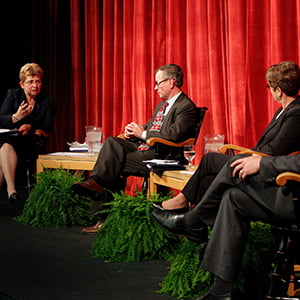
Nurses At The Bedside And In The Boardroom
Hartwick College President Margaret L. Drugovich, DM, P’12 moderated a panel discussion with three top hospital executives discussing the “Nurses’ Role in the Future of Healthcare” on October 5, 2018.
The session was part of a day-long Nursing Symposium marking the 75th anniversary of Hartwick’s Nursing program, which Drugovich called an “incredibly invigorating day” during her welcoming remarks.
All three guests agreed that nurses are essential to patients’ care and recovery, and vital to the functioning of a hospital. The role of Chief Nursing Officer (CNO) was raised more than once as an example of how the nursing profession has expanded from healthcare provider to the role of a partner in decision making.
Betsy Tanner Wright ’79, MBA, FACHE, is president of the University of Pittsburgh Medical Center Chautauqua WCA Healthcare in Jamestown, NY. “I see a very bright future for nurse leadership not only at the executive level, but also at the bedside level,” she said. As President / CEO of WCA Hospital since 1999, she noted a “tremendous growth in leadership opportunities for nurses.” Wright explained that the traditional decision makers in hospital administration have been hospital trustees, administrators, and physicians. She characterized this model as a “3-legged stool.” With the addition of the CNO role to some hospital boards, Wright sees nurses having an important role in hospital administration, which she called “a 4-legged partnership” instead.
Jeff Joyner, MHA, FACHE, is president of A.O. Fox Memorial Hospital in Oneonta, NY. He stressed the importance of the personal connection. He began his career in healthcare as a volunteer at the front desk of a hospital and, even today, monitors how people are greeted when they enter his hospital, and the level of customer service they receive. He explained, “We see people at their worst and at their best.” He noted that while “we are making major advances in healthcare right now with artificial intelligence,” he worries that “we have lost that human touch.” With a computer in each room, he pointed out that doctors and nurses often have their backs to the patient while typing in patients’ vital signs and answers to questions.
“Healthcare is a team sport,” said Mark Webster, MHA, FACHE, president and CEO of Cortland Regional Medical Center in Cortland, NY. “None of us are as smart as all of us.”
“God wired each one differently,” he added. “I’d be a terrible nurse. But I think I am a good executive,” said the veteran healthcare veteran with 30 years of leadership experience, which includes service as president of two other hospitals.
Drugovich asked the panel about the “bedside or boardroom” nature of nursing’s future, the increasing importance of the CNO position, and thoughts on career advancement.
“You all mention the important role of nurses, and a recent survey cited that healthcare decision makers should ensure leadership positions are available to and filled by nurses,” she noted, adding that only 4,600 nurses serve on hospital boards nationwide.
“I think we are seeing progress in the industry,” said Tanner Wright. “We are seeing more nurses as hospital presidents.”
Wright encouraged nurses seeking advancement to earn a master’s degree. “Only 50% of nurses have baccalaureate degrees,” she pointed out.
Webster recommended that nurses who want to move into hospital managerial positions get training in finance and accounting, noting that these were two disciplines that would benefit all aspiring managers.
Joyner told students in the audience to find a mentor. With more than 20 years’ leadership experience across all sectors of the patient care delivery continuum, he acknowledged, “I am very blessed that I had several mentors.” He even suggested that students ask their mentors “to share their mistakes.”
He later challenged aspiring CNOs to “Go and talk to the CNO. Let them know that you are interested.” As a president, he ensured that, “We can find plenty of projects for you to work on.”
Drugovich closed the discussion by thanking the esteemed panel for their insights on the field, and for joining her on the auspicious occasion.
“We’ve been so fortunate to have you here with us,” she said. “There isn’t a single person in this audience that isn’t depending on your success. As CEOs and healthcare industry leaders, I feel we are all in really great hands.”